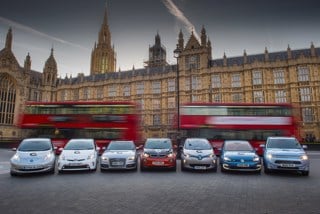Company car drivers failing to charge their plug-in hybrids (PHEVs) means the fleet industry could lose Government backing, warns TMC.
The 2,432 PHEVs and non-plug-in hybrids on its fuel and mileage database averaged 49.06mpg on the road, which is about the same as the average for diesel cars on the database.
Its data on 1,500 PHEVs shows they have a real-world fuel economy of 39.3mpg - many ULEVs have official combined fuel consumption of more than 120mpg - while some drivers do not charge their cars at all.
Paul Hollick, managing director of TMC, said: “Our data shows that although businesses may have the best intentions when it comes to adopting PHEVs, they are not being used in the way manufacturers intended.
“They are either not being charged, or are allocated to drivers who do a lot of long journeys, or a combination of the two.
“As a result, they are expensive to run and release higher greenhouse gases in the real world than they would if used properly.
Hollick said manufacturers and fleets risked losing out on Government incentives for low-CO2 vehicles because fleet customers continue to drag their feet over implementing best practice around plug-in cars.
Last month the Government withdrew grants of up to £4,500 towards the purchase of plug-in vehicles from PHEVs designed to cover less than 70 miles on electric power alone.
Hollick added: “It is now in everyone's interest for fleets to get to grips with plug-in vehicle policy and practice quickly.
“Not least because properly-managed PHEVS are and will remain crucial to running cost-effective car fleets as the transition to full zero-emission transport accelerates. Indeed, PHEVs area great stepping stone towards fully electric vehicles.”
However, Fleet Evolution has rebutted TMC’s findings. Based on its own experiences, the fleet management company said that monitoring fuel and power usage on its fleet showed that more than 90% of drivers of ultra-low emission vehicles regularly charged their cars and used them how they were intended.
Almost 50% of the company's order banks are EVs, and Andrew Leech, managing director at Fleet Evolution, said: “In our experience, there is a very good reason why the three-pin charging cable remains in the boot.
“We provide free home chargers to all our ULEV drivers so they can charge at home. They come with a fast charge cable, which the drivers pay for, so they can recharge at rapid chargepoints at service stations, car parks and supermarkets.
“That means they never need to use the standard cable that comes with their car.”
Hollick said that organisations that take on PHEVs need to make sure they are fit for purpose and that the necessary infrastructure is there.
He added: “How are they going to be charged? At the office? This needs to be nailed down before any electric vehicles are ordered.
“Plug-in hybrids can be cost-effective when drivers cover moderate miles, but only if the cars’ batteries are recharged regularly.
“On the evidence of our sample, one has to question whether some PHEVs ever see a charging cable.
“It’s no secret that there are company drivers out there who choose a PHEV for the hefty company car tax break, then waste fuel by not bothering to use it properly.
“Effective management tools are readily available to allow companies to capture mpg data and address the behaviours of offending drivers, but many don’t use them.”






















earlybird - 13/11/2018 13:34
Yes, a great number of PHEV's are/were ordered simply so the drivers tax bill is lessened. if they have a fuel card they have virtually no incentive to plug them in, so do not. It's a fact, I've seen it first-hand with more than half the drivers i know who have a PHEV and i know a lot of them! they get a lower tax bill and their employer gets a higher fuel bill...crazy. I wonder how the extra fuel duty the government gets compares to the reduced co. car tax taken?